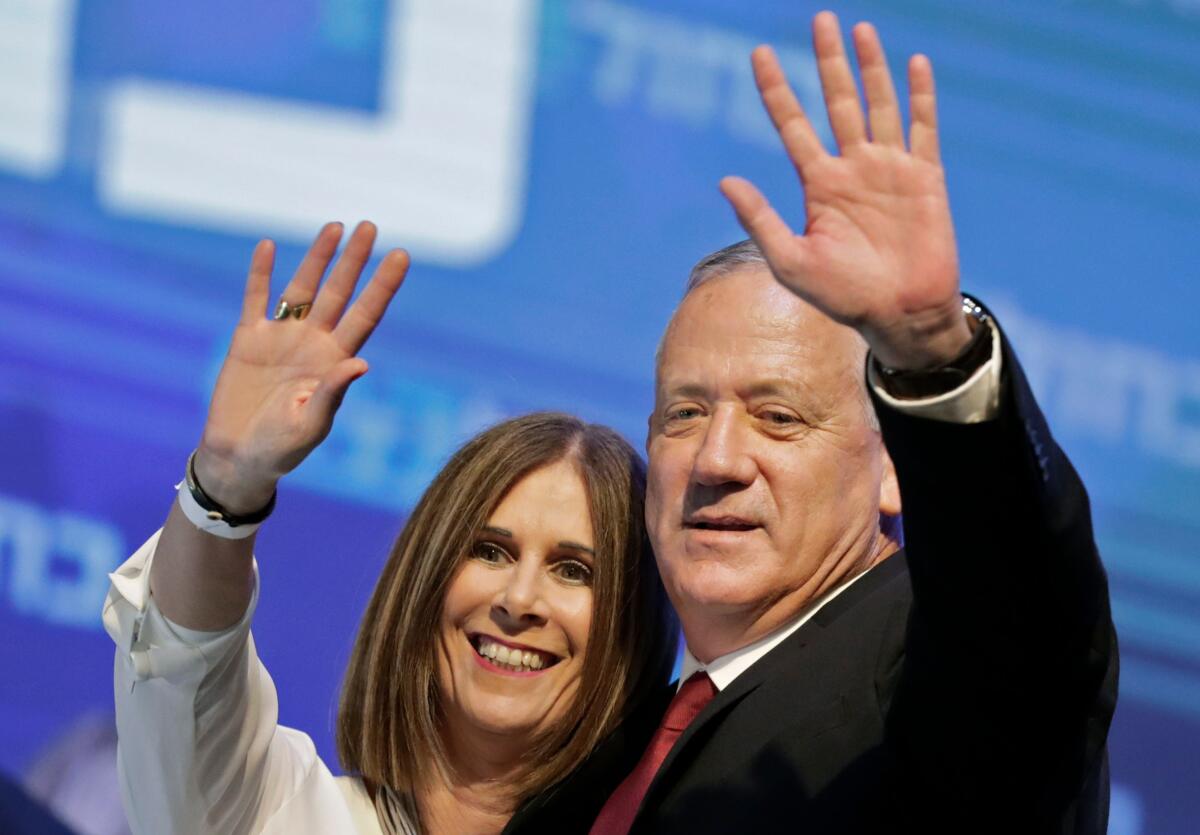Benny Gantz, both politically and personally, is the anti-Netanyahu

- Share via
JERUSALEM — For most Israelis, Benny Gantz remains a mystery.
The taciturn former army chief of staff and leader of the Blue and White party emerged onto the political scene six months ago and has done the seemingly impossible: bested Prime Minister Benjamin Netanyahu in the race to be assigned the difficult task of cobbling together a new Israeli government after inconclusive elections.
His top campaign promise was simple: At every rally and in every interview, Gantz, 60, promised he would not join a government that included Netanyahu, 69, who, after 10 years on the job, faces imminent indictments on a raft of corruption charges and who has used his position to attempt to pass laws that could grant him legal immunity.
Yet Gantz, 6 feet 2 with the deeply lined, craggy face of a man who is used to being outdoors and strikingly emerald blue eyes, has successfully presented himself to Israelis as something of an everyman, and thus a known quantity.
Born in southern Israel to Holocaust survivors, Gantz, an introvert who initially stumbled on the campaign trail, found his footing as the anti-Netanyahu candidate.
Prime Minister Benjamin Netanyahu’s Likud party falls short of a parliamentary majority in Israel’s election, putting him in dire political peril.
Whereas Netanyahu led a campaign of incitement, Gantz openly courted Arab and other minority votes. While Netanyahu sought his fifth term in office, Gantz’s platform includes the promise of term limits.
Though Israeli law does not prohibit a prime minister from serving while under indictment, it has never before happened.
In a radio interview on election day, Avi Nissenkorn, a former labor leader who holds the fifth spot on Gantz’s party list, said, “Netanyahu is not fit to serve under these conditions.”
Gantz has called for pursuing peace with the Palestinians while maintaining Israel’s security interests and has signaled his openness to future territorial concessions as part of a signed agreement.
Buoyed by Trump administration support, Netanyahu has vowed not to permit any Palestinian state to come into existence. Gantz, while campaigning, sidestepped the question of Palestinian statehood but did not rule it out.
But the two men may differ most in their ethos, in the public face they reveal.
For close to three decades, Israelis have been exposed, some say overexposed, to Netanyahu, his three marriages, his son and his wife, Sara, who was recently convicted of misuse of public funds.
In contrast, Gantz offers the humdrum. He has been married once, to Revital, a physiotherapist he met while serving in the paratroops, and they have four children who have not been part of their father’s race.
“His low-key style and relative ineloquence are for many a modest man’s refreshing antithesis to Netanyahu’s perceived bluster and soloism,” Amotz Asa-El, a research fellow at Jerusalem’s Shalom Hartman Institute, told the daily Haaretz in April, during the previous round of elections. “Gantz is seen as balanced, cautious and pragmatic.”
Tarnopolsky is a special correspondent.
More to Read
Sign up for Essential California
The most important California stories and recommendations in your inbox every morning.
You may occasionally receive promotional content from the Los Angeles Times.











